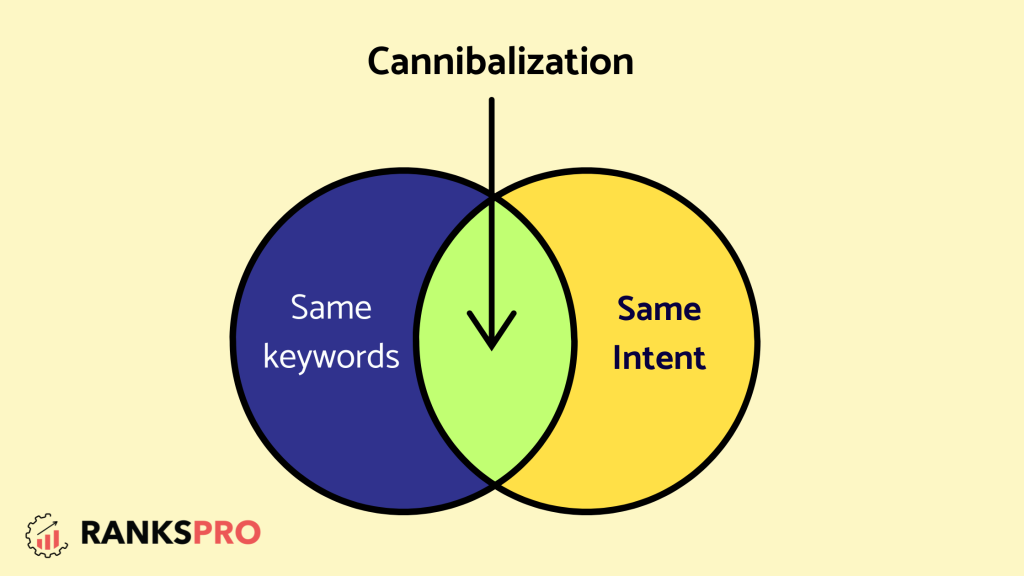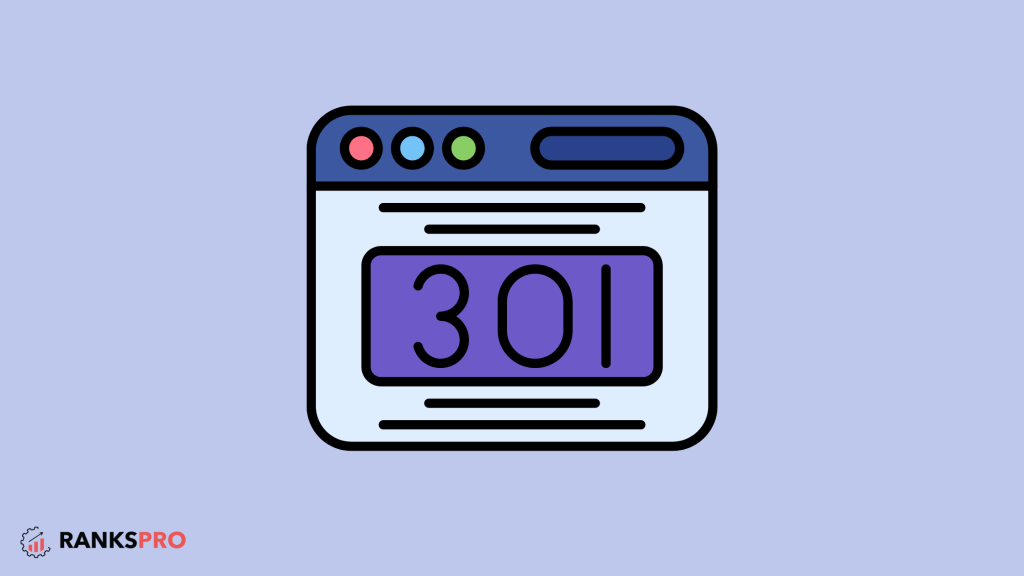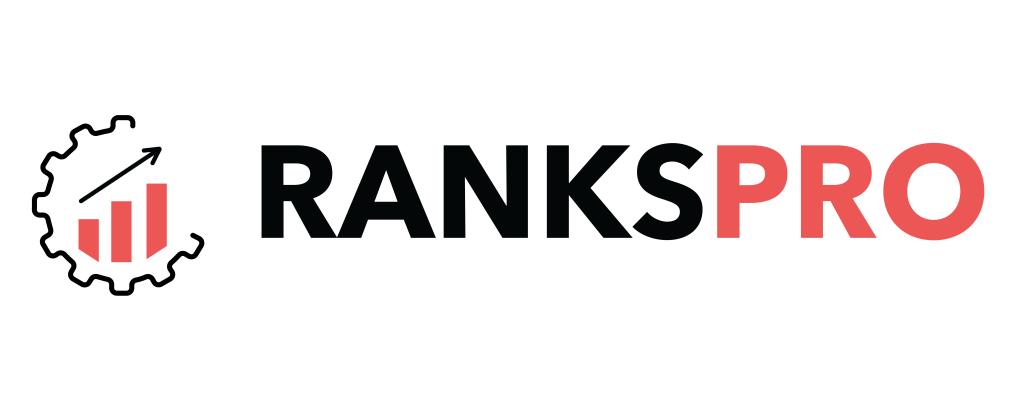Table of Contents
Having multiple pages about the same thing can lead to unexpected or undesirable rankings, but it doesn’t always mean that something’s wrong or needs fixing. However, it can occasionally signal an opportunity to consolidate content to improve rankings and organic performance.
Optimizing your content for the same keywords can lead to a problem – Keyword Cannibalization. This guide will help you know more about this problem and crucial solutions to be implemented.
However, before you dive into solving keyword cannibalization, let’s begin with some introduction.
What is Keyword Cannibalization?
Keyword cannibalization is an issue encountered in Search Engine Optimization (SEO) when multiple web pages on a single domain target the same keywords and fulfill similar purposes. This inadvertently harms the search engine ranking of all involved pages.
The search engine struggles to determine which page is the most relevant result for a given search query containing the targeted keywords.Modern search engine algorithms are adept at identifying and penalizing deliberate keyword stuffing techniques.
Keyword cannibalization can be an unintended consequence of such efforts to manipulate rankings. As a result, search engines like Google may struggle to discern which content deserves a higher ranking within your website’s structure.

Here are some common causes of keyword cannibalization:
- Content Overlap: Over time, a website may accumulate content pieces that address similar topics with a high degree of overlap.
- Content Migration Issues: Publishing a revised version of a page without proper redirection of the original URL can create duplicate content competing for ranking.
- Inconsistent Category Structure: Multiple paths leading to the same product category can confuse search engines regarding the most relevant landing page.
- Over-optimization: Optimizing distinct web pages for the exact same keyword can lead to a cannibalization effect.
- Subcategory Neglect: Failing to optimize subpages within a broader category can create missed ranking opportunities for more specific user queries.
In the case of branded keywords (those incorporating your brand name), it is common to secure multiple high rankings for the same keyword. Therefore, keyword cannibalization is typically less of a concern for branded keywords.
As long as each page you create effectively addresses the user’s search intent, you can generally avoid this issue.
Why you Should Fix Keyword Cannibalization?
There several negative impacts of keyword cannibalization on your content and SEO strategies – from search rankings to downfall in organic traffic.
Here’s a detailed analysis of the key reasons why addressing keyword cannibalization is crucial:
1. Fractured Search Ranking Potential
Search engines prioritize the most relevant result for a given query. When faced with multiple pages from the same domain targeting identical keywords, they struggle to make this determination. This internal competition weakens the overall ranking potential of all involved pages.
Imagine consolidating your efforts into one comprehensive, authoritative page. This focused approach concentrates “ranking power” rather than dispersing it amongst several less impactful pages. The result? Greater visibility for your content.
2. Affected Link and Anchor Text Value
Backlinks, crucial for SEO success, act as votes of confidence from other websites. Keyword cannibalization scatters these valuable backlinks across multiple, less impactful pages.Resources spent acquiring backlinks could have been used to strengthen a single, authoritative page.
Furthermore, a comprehensive, in-depth page is inherently more link-worthy than fragmented content. Similarly, your anchor text and internal links, which guide users and search engines, become diluted when spread amongst multiple competing pages.
3. Crawl Budget Inefficiency
Search engines allocate a “crawl budget,” the number of times their spiders visit your website in a given timeframe. Keyword cannibalization can result in unnecessary crawling and indexing of redundant pages. While smaller websites might not experience this, larger e-commerce sites with extensive product categories can be significantly impacted.
4. Weakened Page Authority
Search engines strive to identify the most relevant and authoritative pages for specific keywords. Keyword cannibalization hinders this process by fragmenting authority across multiple pages. This dilution prevents any single page from achieving its full ranking potential.
Imagine possessing a single, powerful page commanding significant authority. Keyword cannibalization replaces this with several weaker pages, hindering your overall SEO effectiveness.
5. User Confusion and High Bounce Rates
When users encounter multiple pages with similar content targeting the same keywords, confusion and frustration can arise.
They may struggle to identify the page most relevant to their needs, leading to increased bounce rates (users quickly leaving your website) and decreased user engagement. These negative user signals can further penalize your rankings in search engine algorithms.
By proactively identifying and addressing keyword cannibalization, you ensure your website presents a clear, well-structured information architecture. This clarity benefits both search engines and users, ultimately leading to improved SEO performance.
How to Find Cannibalized Keywords?
Above mentioned reasons can help you know that it’s important to remove keyword cannibalization. Now the question is how you can find this issue!
Let’s talk about the common ways to find keyword cannibalization:
1. Monitor Performance Fluctuations
Pay close attention to your website’s traffic data. A sudden drop in clicks or impressions can sometimes indicate that a new piece of content is inadvertently competing with an existing, well-ranked page. While this dip might be temporary, sustained declines warrant further investigation.
2. Analyze Ranking Struggles
Are you pouring effort into content creation yet struggling to achieve desired rankings? This could be a sign of keyword cannibalization. When multiple pages target the same SERP (Search Engine Results Page) intent, search engines may struggle to determine which page is most relevant.
3. Investigate Unexpected Rankings
Despite your keyword strategy, do you find irrelevant pages ranking for certain keywords? This is a strong indicator of keyword cannibalization. Your website architecture should be clear and focused, ensuring the most relevant pages rank for their targeted keywords.
By being attentive to these signals, you can proactively identify potential keyword cannibalization issues on your website.
How to Fix Keyword Cannibalization?
Even websites with a seemingly disorganized structure and scattered keywords can overcome keyword cannibalization.
Here are several effective methods for achieving this:
1. Prioritize Canonicalization
Search engines analyze websites to determine which queries each page is most relevant for. When encountering multiple similar pages, they assign value and may treat some as duplicates. Canonical tags are a powerful tool to clarify your website’s hierarchy.

By implementing a canonical tag, you explicitly inform search engines which page is the primary version and which are considered copies. This ensures the appropriate page receives credit for its content and links.
2. Refine Internal Linking Strategy
While not the most potent solution on its own, refining internal linking practices can contribute to mitigating keyword cannibalization when paired with other strategies. Smart internal linking involves strategically placing hyperlinks within your website to guide users between relevant pages.

If internal links currently lead to pages inadvertently competing for ranking, redirect users to the designated primary page instead. This action concentrates value on the intended target and signals its importance to search engines.
Additionally, review anchor text – the visible text associated with a hyperlink. Anchor text containing cannibalistic keywords might inadvertently boost the ranking of the wrong page for that specific query.3
3. Implement Merging or Redirecting
Before deleting a page entirely, conduct a thorough analysis, comparing it to others on your site. Consider repurposing the content if it holds value. Evaluate the page’s goal, content quality, and performance metrics against its competitors to identify the primary URL.

Once you have a clearer understanding of your website’s structure, strategically delete weaker pages and implement 301 redirects to direct users to the “stronger” pages.
Deleting a page without redirection results in lost link value, both internal and external. 301 redirects effectively transfer link equity from problematic pages to their more relevant, optimized counterparts.
4. Optimize Based on User Intent
Keywords are merely the surface layer, masking the user’s underlying intent – their actual goal behind a specific search query. Understanding user intent is crucial for effective SEO. There are three primary categories of user intent:
1. Navigational: Users with navigational intent seek to visit a specific website.
2. Informational: Users with informational intent aim to find answers or gain knowledge.
3. Transactional: Users with transactional intent are actively looking to make a purchase.
Additionally, a “commercial search” intent exists. These users plan a purchase and are actively comparing product features and prices before making a final decision.

Optimizing your website’s content with user intent in mind significantly reduces keyword cannibalization. By aligning your content with the user’s specific goal, you prevent search engines from becoming confused by multiple seemingly relevant results from your domain for the same query.
5. Utilize Indexing Control
In specific circumstances, you can leverage the “noindex” tag as a solution for keyword cannibalization. This tag instructs search engine crawlers not to index a particular page, preventing it from appearing in search results.

Consider applying “noindex” to pages that directly compete with a designated primary page. “Noindex” can be implemented as a meta robots tag within the page’s head section or as an X-Robots-Tag HTTP response header.
The first option involves adding <meta name=”robots” content=”noindex”> to the page’s header, which will block most search engine crawlers from indexing the page. Alternatively, you can utilize the X-Robots-Tag header with the value “noindex” or no value at all.
By implementing these strategies, you can effectively address keyword cannibalization and ensure your website presents a clear and well-organized structure to both search engines and users.
Master your Brand Keywords with RanksPro Keyword Tool
By following the outlined strategies to tackle keyword cannibalization, you can ensure your website presents a clear, well-organized information architecture. This clarity benefits both search engines and users, ultimately leading to improved SEO performance and increased organic traffic.
Developing a well-defined keyword strategy from the outset can significantly reduce the risk of keyword cannibalization down the line. This is where RanksPro comes in!
RanksPro, a reliable and trusted SEO tool, empowers you to conduct comprehensive keyword research, identify high-volume, low-competition keywords that perfectly align with your target audience’s search intent.
With RanksPro, you can:
- Uncover a treasure trove of relevant keywords: Explore a vast database of keywords to identify those that perfectly match your content and target audience.
- Gain valuable search volume insights: Make informed decisions by understanding the search volume associated with each keyword.
- Stay ahead of the curve with competition analysis: RanksPro helps you assess the competition for your chosen keywords, allowing you to strategically target keywords with optimal ranking potential.
By leveraging RanksPro’s comprehensive suite of SEO tools, you can not only optimize your website for relevant keywords but also proactively prevent keyword cannibalization, ensuring your content reaches the intended audience and achieves top search engine ranking.


